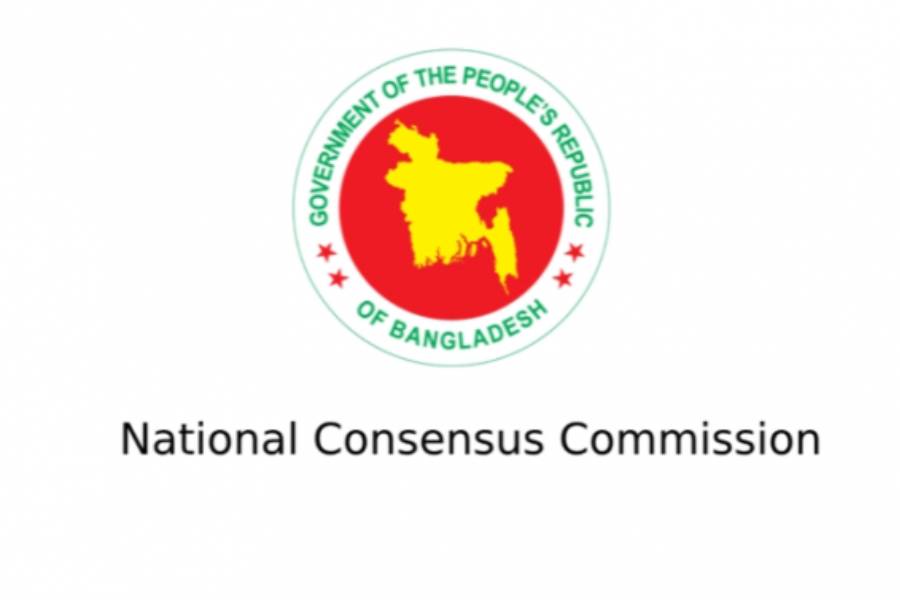JULY CHARTER TALKS CONCLUDE BY MONTH-END
Parties okay some constitutional changes, more accords expected

Published :
Updated :

Political parties have agreed on some fundamental changes to the current constitution but still stand poles apart from other basics to sign a national charter on the July mass uprising, sources say, and expect breakthroughs soon.
Despite the National Consensus Commission (NCC) struggling to get the political parties on a common ground on fundamental reforms, it expects a breakthrough in next week's uninterrupted series wrap-up discussions.
Representatives from 30 political parties, including the Bangladesh Nationalist Party (BNP), Bangladesh Jamaat-e-Islami and the National Citizen Party (NCP), among others, participated in the talks with the NCC for a much-sought-after fresh start following the ouster of the Sheikh Hasina government.
A major development is the political parties unanimously agreed on restoration of the defunct election-time caretaker-government system and spoke in favour of referendum for any future change to this system.
However, they have yet to reach a point on the process of appointing the head of caretaker government.
A sort of standoff prevailed over bicameral parliament as parties couldn't agree on how it should be formed. The parties left the issue to the commission to decide-and the commission is likely to decide it at the next sitting set for Sunday.
Parties agreed on permanently allocating 100 seats for women in the parliament. However, they have yet to reach a consensus on determining this method (direct election or old-style). BNP stands for old style while some others for direct election.
Political parties active in the post-uprising political arena also agreed that cabinet approval should be added instead of Prime Minister's signature to declare a state of emergency to stop misuse of the provision, including for political purposes. For this to happen, the article 141 (Ka) of the constitution needs to be amended. And parties agreed.
Parties also partially agreed on appointment of the chief justice and reduction in the unlimited power of the President.
They are also agreed on amending the article 100 of the constitution for presidential clemency to check the widespread misuse of the discretionary power.
Also, consensus reached on decentralisation of the judiciary. They agreed to amend the constitution to set up High Court benches at the divisional level and lower courts at Upazila levels upon conditions.
Amid growing demands, BNP, a major stakeholder in the process, finally agreed to the proposal that none should hold the post of Prime Minister for more than 10 years in one's lifetime.
The former ruling party, however, vented concern about any move to "weaken the executive". The major stakeholder prioritised the next 13th parliament to decide on the issues where political parties fell apart at the NCC dialogues.
Some parties, including Jamaat-e-Islami, however, suggest going for referendum to allow people to decide on the disagreements and key reforms if political parties and NCC failed to reach consensus.
Vice Chairman of the NCC Prof Ali Riaz, talking to the FE, says he is confident about forging consensus for the July charter within this month.
"I don't have any confusion in mind about the formulation of a national charter by the end of this month. This is a commitment of all political parties, as far as we believe," he insists.
Prof Riaz this week urged the political parties not to fail the dialogue rather take the ownership of the transition process.
"There is no room to fail," he underscored.
He said his commission is determined to reach consensus on the fundamental issues in next week's intensive talks.
"We have five uninterrupted sessions next week, starting Sunday. We are hopeful of reaching consensus during the week," he says, without further explaining how they would mitigate the gap among the political parties on the major reforms.
He asserts that political parties have made big progress on some basic issues. And, the responses of the political parties were "satisfactory and cooperative".
Calling the long-haul discussion of the commission with political parties as "unprecedented work" in the country's history, he says there was no previous instance of such national dialogue.
nsrafsanju@gmail.com


 For all latest news, follow The Financial Express Google News channel.
For all latest news, follow The Financial Express Google News channel.